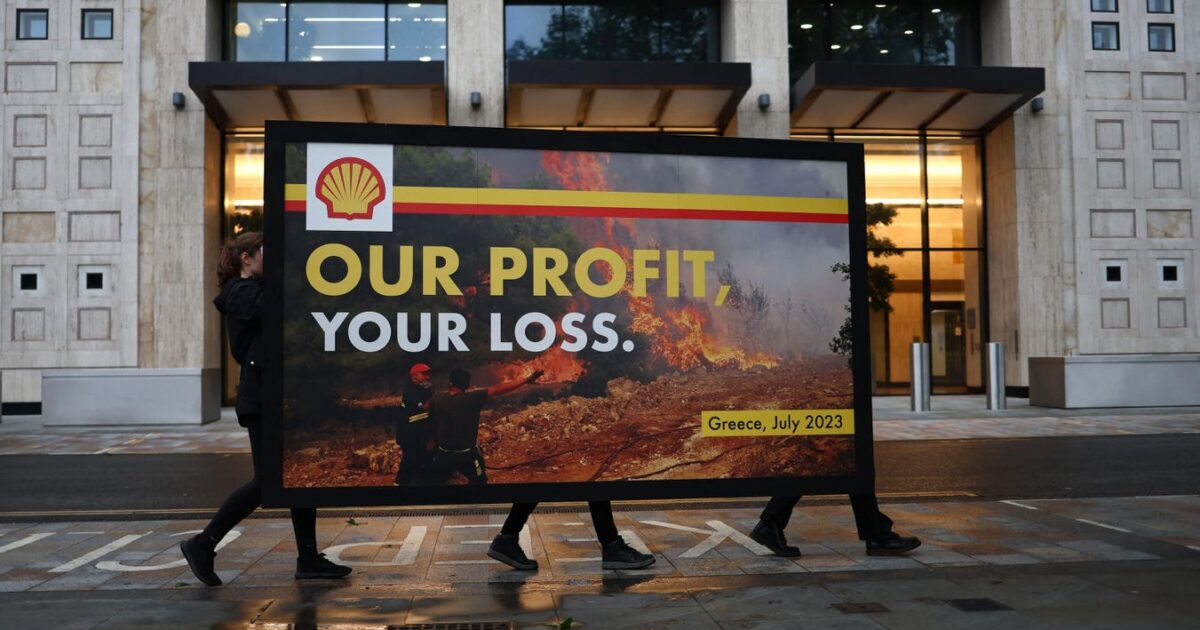U.K. Ad Agencies Call For Total Ban On Fossil Fuel Marketing

Greenpeace activists outside Shell’s headquarters in London carry a spoof advertising billboard … More
More than 100 U.K. advertising organizations representing over 1,000 advertisers have joined forces to back a nationwide ban on fossil fuel advertising and sponsorship, ahead of a parliamentary debate.
The initiative comes after a petition to ban fossil fuel ads, led by British TV presenter and naturalist Chris Packham, garnered over 110,000 signatures. The appeal draws parallels between fossil fuel companies and the tobacco industry, and calls for restrictions on oil and gas products similar to those that are imposed on cigarette marketing.
“Fossil fuel companies are the cigarette companies of the 21st century, using advertising and sponsorship to greenwash their image and sell products that are harmful to human health,” states the joint letter to the U.K. government, signed by the organizations.
The letter goes on: “Fossil fuels are the leading cause of climate change, yet despite repeated warnings that fossil fuel advertisers are expanding their oil and gas operations, they continue to market themselves as leaders in an energy transition.”
The initiative was coordinated by the nonprofits Clean Creatives, Creatives for Climate and Purpose Disruptors, and includes prominent agencies and media companies around the U.K., with many emphasizing that they have already taken voluntary steps to distance themselves from fossil fuel clients, in spite of the potential financial impact.
“Turning down millions in revenue can hurt a small company,” said Matt Longley, CEO of London ad agency MOBSTA. “But we survived and now we are thriving because of the decision we took. We can look each other in the eye and know we’ve made the right choice for us, for our clients, and for the planet.”
Caroline Davison, managing director at agency Elvis, told media: “We need the government to step up to the plate, create further momentum and introduce legislation that bans fossil fuel advertising as it did tobacco marketing. Re-focusing creative industries to put their considerable talents towards promoting a greener future is a win for all.”
The campaign comes in the wake of a partial ban in Spain on the advertising of petroleum products. Under new legislation announced by Spanish consumer affairs minister Pablo Bustinduy last week, advertisements for petrol or diesel will only be permitted if the products contain renewable components such as biofuel.
The British push for advertising restrictions comes amid mounting evidence of fossil fuels’ role in the climate crisis, which health organizations identify as the greatest global threat to human health. In the U.K. alone, air pollution—largely driven by fossil fuel combustion—contributes to up to 43,000 deaths annually. The Royal College of Physicians projects that by 2040, the economic costs of air pollution could reach £30 billion per year.
The initiative has gained momentum beyond the advertising sector. Thirty health organizations representing 12 million healthcare professionals worldwide have severed ties with fossil fuel advertisers. Major U.K. cultural institutions, including the Royal Shakespeare Company and National Portrait Gallery, have also ended fossil fuel sponsorships.
Several U.K. cities have already implemented local bans, with Edinburgh and Sheffield leading the way. The movement echoes UN Secretary-General António Guterres’s 2024 call for governments to ban fossil fuel advertising to protect public health and address climate change.
“Advertising fossil fuels is incompatible with public health,” said Elaine Mulcahy, director of the U.K. Health Alliance on Climate Change. “Just as we once banned tobacco ads to protect people from a deadly product, we must now do the same with fossil fuels, which are driving a global health crisis through air pollution, climate change, and environmental degradation.”
The advertising industry’s support for marketing restrictions reflects growing concerns about greenwashing and the role of advertising in climate change. Previous restrictions on tobacco advertising have proven effective, reducing smoking uptake by 37%. Similar success has been seen with bans on unhealthy food advertising on London’s transport network.
The parliamentary debate, scheduled for July 7, marks the first time U.K. lawmakers will formally discuss nationwide restrictions on fossil fuel marketing. A unified stance from the advertising industry could significantly influence the outcome, potentially positioning the U.K. as a global leader in addressing climate change through marketing regulation. If successful, the ban would represent a landmark shift in how fossil fuel companies can promote their products in one of the world’s major advertising markets.

